-
 Bitcoin
Bitcoin $117300
1.99% -
 Ethereum
Ethereum $3884
5.89% -
 XRP
XRP $3.268
9.33% -
 Tether USDt
Tether USDt $1.000
0.02% -
 BNB
BNB $783.0
1.78% -
 Solana
Solana $173.6
3.51% -
 USDC
USDC $0.9999
0.00% -
 Dogecoin
Dogecoin $0.2193
7.00% -
 TRON
TRON $0.3380
0.30% -
 Cardano
Cardano $0.7769
5.08% -
 Stellar
Stellar $0.4350
9.36% -
 Hyperliquid
Hyperliquid $40.23
5.78% -
 Sui
Sui $3.739
6.95% -
 Chainlink
Chainlink $18.30
9.46% -
 Bitcoin Cash
Bitcoin Cash $581.7
2.11% -
 Hedera
Hedera $0.2577
5.51% -
 Ethena USDe
Ethena USDe $1.001
0.00% -
 Avalanche
Avalanche $23.08
4.23% -
 Litecoin
Litecoin $121.7
2.24% -
 UNUS SED LEO
UNUS SED LEO $8.962
-0.34% -
 Toncoin
Toncoin $3.332
1.36% -
 Shiba Inu
Shiba Inu $0.00001273
3.39% -
 Uniswap
Uniswap $10.35
6.84% -
 Polkadot
Polkadot $3.818
4.01% -
 Dai
Dai $1.000
0.01% -
 Bitget Token
Bitget Token $4.446
2.13% -
 Cronos
Cronos $0.1491
4.96% -
 Monero
Monero $255.4
-9.78% -
 Pepe
Pepe $0.00001099
4.80% -
 Aave
Aave $284.0
8.01%
What is the governance mechanism of cryptocurrencies? How do coin holders participate in decision-making?
Cryptocurrency governance varies widely, from centralized control to decentralized token-holder voting on upgrades, features, and resource allocation, impacting long-term sustainability.
Feb 27, 2025 at 02:06 pm
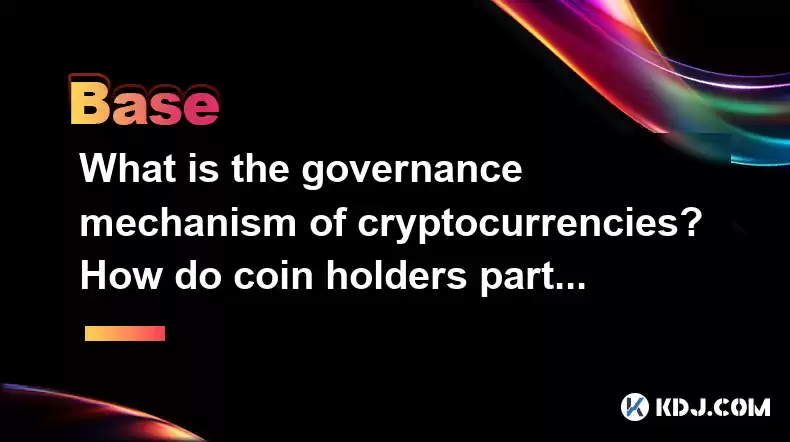
What is the Governance Mechanism of Cryptocurrencies? How Do Coin Holders Participate in Decision-Making?
Key Points:
- Cryptocurrency governance mechanisms vary widely, ranging from centralized models controlled by a single entity or small group to fully decentralized models where decisions are made collectively by token holders.
- Participation in decision-making typically involves voting on proposals related to protocol upgrades, feature additions, resource allocation, and other critical aspects of the cryptocurrency project.
- Voting mechanisms differ significantly, with some employing simple majority voting, while others utilize more complex systems like quadratic voting or delegated governance.
- The effectiveness of governance depends on factors such as participation rate, the clarity of proposals, and the fairness and transparency of the voting process.
- Understanding the specific governance model of a cryptocurrency is crucial for investors and users to assess its long-term sustainability and potential for growth.
Understanding Cryptocurrency Governance Mechanisms:
Cryptocurrency governance mechanisms dictate how decisions affecting a blockchain network are made. These mechanisms vary significantly, impacting the network's decentralization, security, and overall direction. Understanding these mechanisms is crucial for anyone involved in the cryptocurrency ecosystem, from developers to investors.
- On-Chain Governance: This refers to governance processes directly integrated into the blockchain's code. Decisions are typically made through on-chain voting, where token holders cast votes directly on proposals submitted to the network. This ensures transparency and immutability, as all votes and decisions are permanently recorded on the blockchain. However, on-chain governance can be complex to implement and may be susceptible to manipulation if not carefully designed. For instance, a poorly designed on-chain voting system could be vulnerable to Sybil attacks, where a single entity creates numerous fake identities to manipulate the voting outcome. Moreover, the technical complexity involved can make participation challenging for less technically savvy users. The development and implementation of secure, efficient, and user-friendly on-chain governance systems are active areas of research and development within the cryptocurrency community. Different blockchains utilize various cryptographic techniques and consensus mechanisms to ensure the integrity and security of on-chain governance processes. The level of technical expertise required to fully understand and participate in on-chain governance can be a barrier for some users. Educational resources and simplified user interfaces are crucial for enhancing participation and promoting wider adoption of on-chain governance.
- Off-Chain Governance: In contrast to on-chain governance, off-chain mechanisms involve decision-making processes that occur outside the blockchain itself. This can involve forums, community discussions, or dedicated governance platforms. While off-chain governance can be more flexible and accessible, it sacrifices some of the transparency and immutability provided by on-chain methods. The risk of manipulation or bias is higher in off-chain systems, as there is no inherent guarantee of the integrity of the process. Furthermore, the lack of a permanent record on the blockchain can make it difficult to track decisions and hold individuals accountable. Despite these drawbacks, off-chain governance remains a common approach, particularly for projects in their early stages of development or those with complex governance structures that are not easily implemented on-chain. The effectiveness of off-chain governance depends heavily on the level of community engagement and the ability of the community to reach consensus. Robust communication channels and clear guidelines are essential for ensuring fair and transparent decision-making in off-chain governance systems.
- Hybrid Governance: Many cryptocurrency projects adopt a hybrid approach, combining on-chain and off-chain governance mechanisms. This allows them to leverage the benefits of both systems while mitigating their respective drawbacks. For instance, a project might use on-chain voting for critical decisions affecting the protocol's core functionality while using off-chain forums for discussions and preliminary proposals. A hybrid approach offers greater flexibility and can be tailored to the specific needs and characteristics of a project. However, it also requires careful coordination and management to ensure consistency and prevent conflicts between the different governance channels. A well-designed hybrid system requires clear guidelines defining the roles and responsibilities of each governance mechanism and ensuring seamless communication between them. The success of a hybrid governance model depends on the careful balancing of on-chain security and off-chain flexibility.
- DAO Governance: Decentralized Autonomous Organizations (DAOs) represent a significant development in cryptocurrency governance. DAOs are organizations governed by rules encoded on a blockchain, typically using smart contracts. This allows for automated execution of decisions and eliminates the need for centralized authority. However, the complexity of designing and deploying secure and effective DAOs remains a challenge. DAOs face challenges related to security vulnerabilities, scalability, and the potential for malicious actors to exploit loopholes in the smart contracts governing the organization. Furthermore, the decision-making processes within DAOs can be complex and require significant technical expertise to participate effectively. Despite these challenges, DAOs offer a compelling vision for future governance models in the cryptocurrency space, enabling greater transparency, accountability, and community participation.
How Coin Holders Participate in Decision-Making:
The specific mechanisms for coin holder participation vary widely depending on the cryptocurrency's governance structure. However, several common approaches exist:
- Direct Voting: In many cryptocurrencies, token holders can directly participate in decision-making by casting votes on proposals. This can involve voting on protocol upgrades, feature additions, changes to the tokenomics, or other significant changes to the project. The weight of each vote is often proportional to the number of tokens held, giving larger holders more influence. However, this can raise concerns about centralization and the potential for wealth concentration to influence governance outcomes. Mechanisms such as quadratic voting, where the influence of a vote diminishes with the number of tokens held, can mitigate this issue. Direct voting mechanisms require careful design to prevent manipulation and ensure fairness and transparency. The clarity and comprehensibility of proposals are critical to encouraging informed participation. Effective communication strategies and user-friendly interfaces are also essential for maximizing participation rates.
- Delegated Voting: In larger cryptocurrencies with a vast number of token holders, direct voting can be impractical. Delegated voting allows token holders to delegate their voting rights to representatives they trust. These representatives, often elected by the community, then vote on behalf of their constituents. Delegated voting can improve efficiency and participation but introduces the risk of representative unresponsiveness or potential conflicts of interest. Careful consideration must be given to the selection process of representatives and the mechanisms for holding them accountable. The system should provide avenues for recall or removal of underperforming or unresponsive delegates. Transparency in the voting process is also crucial to maintain trust and prevent manipulation.
- Liquid Democracy: Liquid democracy combines aspects of direct and delegated voting. Users can choose to vote directly on proposals or delegate their voting power to other individuals. This allows for flexibility and adaptability, accommodating different levels of user engagement and expertise. However, liquid democracy systems require careful design to prevent manipulation and ensure that voting power is distributed fairly. The system should include mechanisms to prevent cascading delegations, where a small group of individuals might accumulate excessive voting power. Furthermore, clear rules and guidelines are needed to define the conditions under which users can switch between direct and delegated voting.
- Forums and Community Discussions: Many cryptocurrencies rely on forums, online communities, and social media platforms for decision-making. These platforms facilitate discussions among token holders, allowing them to express their opinions and contribute to the development of proposals. While these methods can foster community engagement and encourage collaborative decision-making, they lack the formal structure and transparency of on-chain voting mechanisms. The lack of formal voting processes can lead to ambiguities and difficulties in reaching consensus. Furthermore, the influence of individual participants might not be proportional to their token holdings, potentially leading to biased outcomes.
- Signal-Based Governance: This approach utilizes signals from the community to guide decision-making. These signals might include the volume of discussions on a particular topic, the number of users using a specific feature, or the results of surveys and polls. While signal-based governance can be effective in identifying community preferences, it's crucial to ensure that the signals accurately reflect the views of the token holders and aren't manipulated or skewed by external factors. The interpretation and weighting of signals also need careful consideration to avoid biases and ensure fair outcomes.
FAQs:
Q: What happens if there's a disagreement among coin holders on a particular proposal?
A: The resolution of disagreements depends on the specific governance mechanism. Some systems use simple majority voting, while others might require supermajorities or weighted voting based on token holdings. In some cases, complex decision-making processes might be employed, such as quadratic voting or delegated governance. Disagreements can also lead to the proposal being rejected or tabled for further discussion and refinement. The specific procedures for handling disagreements are outlined in the cryptocurrency's governance documentation.
Q: How can I participate in the governance of my favorite cryptocurrency?
A: Participation methods depend on the specific cryptocurrency's governance structure. It usually involves holding tokens of that cryptocurrency and actively participating in the decision-making processes, whether through direct voting, delegated voting, or participating in community discussions. It is essential to understand the specific rules and procedures of the cryptocurrency's governance mechanism before participating. Often, projects provide detailed documentation on their governance processes and how token holders can participate.
Q: Are all cryptocurrency governance mechanisms equally effective?
A: No, the effectiveness of different cryptocurrency governance mechanisms varies widely. Factors such as participation rates, the clarity and transparency of proposals, the fairness and impartiality of the voting process, and the security of the system all impact effectiveness. Some systems are more susceptible to manipulation or bias than others. A well-designed governance system is crucial for the long-term success and sustainability of a cryptocurrency project.
Q: What are the risks associated with participating in cryptocurrency governance?
A: Risks include the potential for manipulation or bias in the decision-making process, the risk of your voting power being diluted, and the risk of making decisions that could negatively impact the value of your tokens. It's essential to carefully research and understand the governance mechanisms of any cryptocurrency before participating.
Q: How can I learn more about the governance mechanisms of a specific cryptocurrency?
A: Most cryptocurrency projects publish detailed information about their governance mechanisms on their websites or in white papers. You can also find information through community forums, social media groups, and independent research. It's crucial to rely on reputable sources and carefully review the information before making any decisions.
Disclaimer:info@kdj.com
The information provided is not trading advice. kdj.com does not assume any responsibility for any investments made based on the information provided in this article. Cryptocurrencies are highly volatile and it is highly recommended that you invest with caution after thorough research!
If you believe that the content used on this website infringes your copyright, please contact us immediately (info@kdj.com) and we will delete it promptly.
- Bitcoin Reserve, Gold Revaluation, Congress Considers: A New Era for US Financial Strategy?
- 2025-08-08 04:30:12
- KAITO's Momentum: Can It Reclaim Support Amidst Social Media Scrutiny?
- 2025-08-08 04:30:12
- Pi Coin's dApp and AI Potential: Building a Decentralized Future
- 2025-08-08 02:30:12
- Ruvi AI Takes the Lead: Outshining Dogecoin on CoinMarketCap
- 2025-08-08 02:50:12
- Cryptos Under $1: Is Ripple Still the King?
- 2025-08-08 03:50:12
- Cold Wallet, Bonk Price, ICP Price: Navigating the Crypto Landscape in 2025
- 2025-08-08 03:56:12
Related knowledge
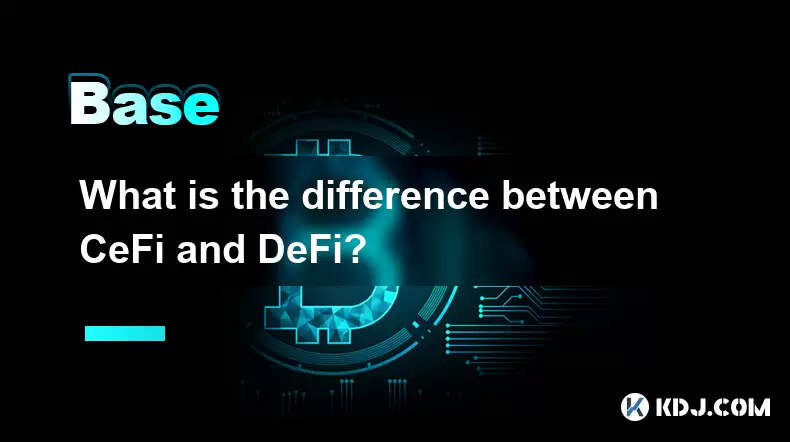
What is the difference between CeFi and DeFi?
Jul 22,2025 at 12:28am
Understanding CeFi and DeFiIn the world of cryptocurrency, CeFi (Centralized Finance) and DeFi (Decentralized Finance) represent two distinct financia...

How to qualify for potential crypto airdrops?
Jul 23,2025 at 06:49am
Understanding What Crypto Airdrops AreCrypto airdrops refer to the distribution of free tokens or coins to a large number of wallet addresses, often u...
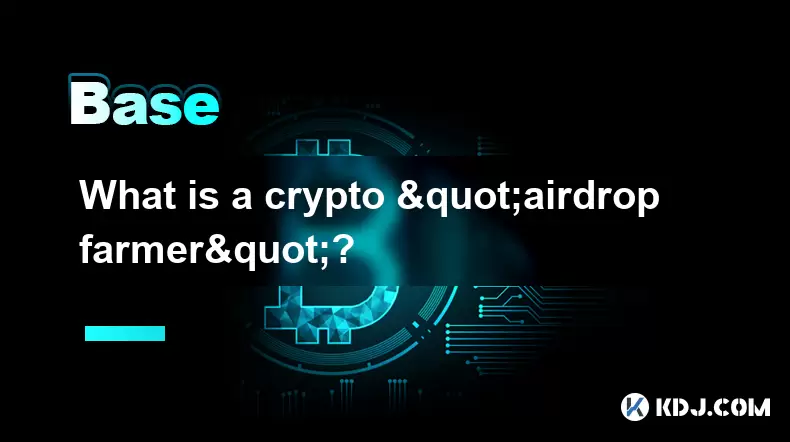
What is a crypto "airdrop farmer"?
Jul 24,2025 at 10:22pm
Understanding the Role of a Crypto 'Airdrop Farmer'A crypto 'airdrop farmer' refers to an individual who actively participates in cryptocurrency airdr...
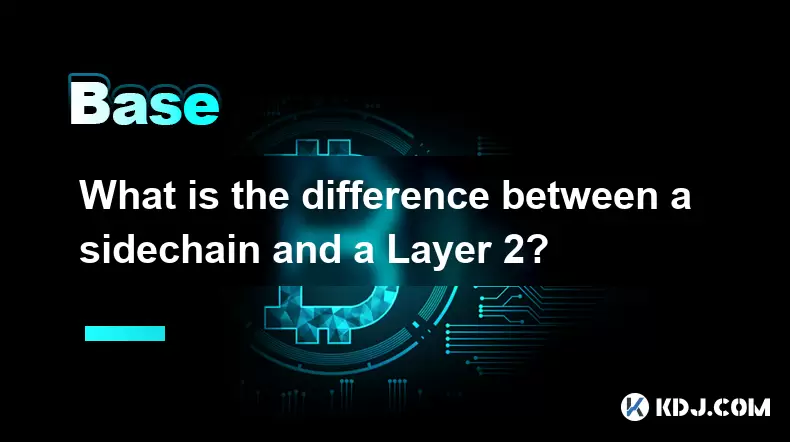
What is the difference between a sidechain and a Layer 2?
Jul 20,2025 at 11:35pm
Understanding the Concept of SidechainsA sidechain is a separate blockchain that runs parallel to the main blockchain, typically the mainnet of a cryp...
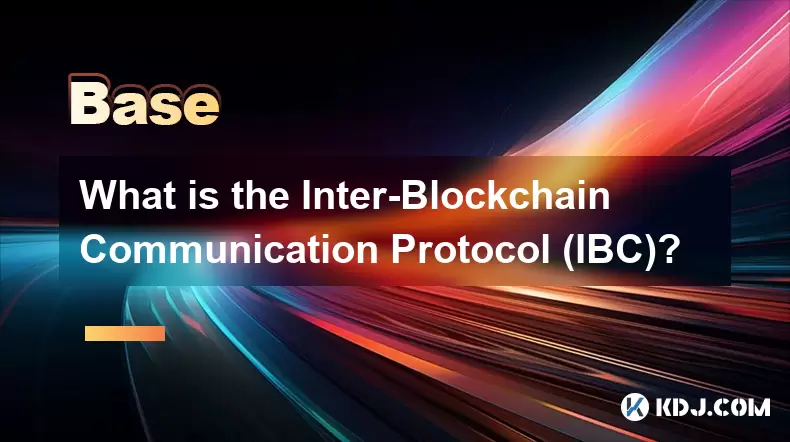
What is the Inter-Blockchain Communication Protocol (IBC)?
Jul 19,2025 at 10:43am
Understanding the Inter-Blockchain Communication Protocol (IBC)The Inter-Blockchain Communication Protocol (IBC) is a cross-chain communication protoc...
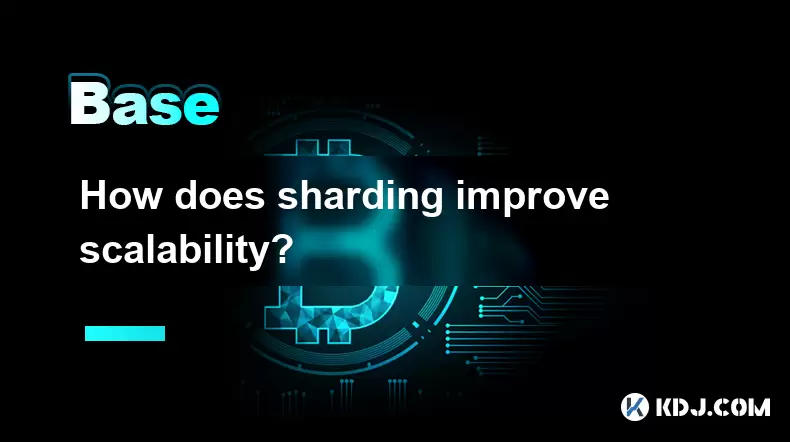
How does sharding improve scalability?
Jul 20,2025 at 01:21am
Understanding Sharding in BlockchainSharding is a database partitioning technique that is increasingly being adopted in blockchain technology to enhan...

What is the difference between CeFi and DeFi?
Jul 22,2025 at 12:28am
Understanding CeFi and DeFiIn the world of cryptocurrency, CeFi (Centralized Finance) and DeFi (Decentralized Finance) represent two distinct financia...

How to qualify for potential crypto airdrops?
Jul 23,2025 at 06:49am
Understanding What Crypto Airdrops AreCrypto airdrops refer to the distribution of free tokens or coins to a large number of wallet addresses, often u...

What is a crypto "airdrop farmer"?
Jul 24,2025 at 10:22pm
Understanding the Role of a Crypto 'Airdrop Farmer'A crypto 'airdrop farmer' refers to an individual who actively participates in cryptocurrency airdr...

What is the difference between a sidechain and a Layer 2?
Jul 20,2025 at 11:35pm
Understanding the Concept of SidechainsA sidechain is a separate blockchain that runs parallel to the main blockchain, typically the mainnet of a cryp...

What is the Inter-Blockchain Communication Protocol (IBC)?
Jul 19,2025 at 10:43am
Understanding the Inter-Blockchain Communication Protocol (IBC)The Inter-Blockchain Communication Protocol (IBC) is a cross-chain communication protoc...

How does sharding improve scalability?
Jul 20,2025 at 01:21am
Understanding Sharding in BlockchainSharding is a database partitioning technique that is increasingly being adopted in blockchain technology to enhan...
See all articles

























































































